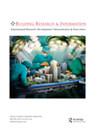设施管理者对葡萄牙高等教育机构建筑条件评估的看法
IF 3.7
3区 工程技术
Q1 CONSTRUCTION & BUILDING TECHNOLOGY
引用次数: 0
摘要
摘要本研究旨在概述葡萄牙高等教育建筑设施管理阶段的建筑状况评估。编制了一份包含188个问题的问卷调查,葡萄牙19所高等教育机构的设施管理部门的专家对此进行了答复。采用层次分析法进行的数据分析显示了葡萄牙高等院校设施管理和建筑条件评估过程中的困难,以及专家在建筑条件评估和设施管理方面的偏好。还评估了四个建筑状况评估参数。尽管不能代表葡萄牙所有高等教育机构,但研究结果表明,在新的数字技术和预防行动的优先次序的支持下,高等教育机构建筑存量的管理需要发生重大变化。葡萄牙设施管理的这种独特观点为其他(欧洲)国家HEI的设施管理人员提供了有用的指导,并与其他建筑类型相关。本文章由计算机程序翻译,如有差异,请以英文原文为准。
Facility manager perspectives on building condition assessment for Portuguese higher education institutions
ABSTRACT This study aims to provide an overview of the building condition assessment at the facility management stage in higher education buildings in Portugal. A questionnaire survey containing 188 questions was developed and was responded to by experts in the facility management departments of 19 higher education institutions (HEIs) in Portugal. The data analysis, using analytic hierarchy process, showed the difficulties related to the process of facility management and building condition assessment and the experts’ preferences in building condition assessment and facility management in Portuguese HEIs. Four building condition assessment parameters were also evaluated. Although not representative of all HEIs in Portugal, the findings indicate that there needs to be a significant change in the management of the HEI building stock with the support of new digital technologies and the prioritization of preventive actions. This unique view of facility management in Portugal provides useful pointers for facility managers working in HEI in other (European) countries and has relevance to other building typologies.
求助全文
通过发布文献求助,成功后即可免费获取论文全文。
去求助
来源期刊

Building Research and Information
工程技术-结构与建筑技术
CiteScore
8.60
自引率
7.70%
发文量
43
审稿时长
>12 weeks
期刊介绍:
BUILDING RESEARCH & INFORMATION (BRI) is a leading international refereed journal focussed on buildings and their supporting systems. Unique to BRI is a focus on a holistic, transdisciplinary approach to buildings and the complexity of issues involving the built environment with other systems over the course of their life: planning, briefing, design, construction, occupation and use, property exchange and evaluation, maintenance, alteration and end of life. Published articles provide conceptual and evidence-based approaches which reflect the complexity and linkages between cultural, environmental, economic, social, organisational, quality of life, health, well-being, design and engineering of the built environment.
 求助内容:
求助内容: 应助结果提醒方式:
应助结果提醒方式:


